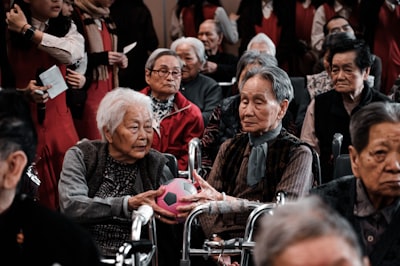Summary
A heartwarming story emerges from Wuhan, China, where 102-year-old Jiang Weidi has become a symbol of vitality and friendship at the Enjoy Ages Nursing Home. Having lived there for over three years, Jiang fills his days with books, art, and music, demonstrating not only longevity but also a zest for creative pursuits. His bond with 85-year-old Grandmother Zhang has captivated both their carers and the online public, stemming from his ability to charm her—and others—with his musical talents, including playing the hulusi and self-taught piano skills.
Analysis
This narrative highlights the often-underestimated vibrancy and emotional life of elderly individuals. The blossoming companionship between Jiang and Zhang runs counter to stereotypes of old age as a period devoid of romance, creativity, or growth. The description of Jiang as "lively, curious, and playful" challenges societal assumptions about the limitations of centenarians.
From a social perspective, stories like this draw necessary attention to the culture within nursing homes—a setting too frequently associated with isolation or decline rather than renewal or meaningful connection. The media framing, focusing on Jiang's talents and their bond, also speaks to an ethos in some Asian cultures that deeply respect elders and their lifelong capacity for self-improvement. Nonetheless, the story may gloss over broader systemic challenges many elderly face, such as loneliness or lack of resources.
Discussion
Why does this story resonate so widely? Perhaps it's the rare glimpse it offers into the potential for joy and personal growth regardless of age—an inspiration in societies rapidly aging around the globe. The case also raises thought-provoking questions: How might institutions cultivate more spaces for such relationships? What can younger generations learn from the continued agency and curiosity of the elderly?
Moreover, the sharing of music, art, and companionship between Jiang and Zhang symbolically underscores the universal power of human connection. In an era preoccupied with youth, stories like this gently provoke us to rethink how we value our elderly, challenging us to imagine policies or social infrastructures that foster similar bonds and holistic well-being in late life.
The viral nature of Jiang and Zhang’s story suggests a growing public appetite for narratives that move beyond tragedy or decline—instead spotlighting human dignity, capability, and resilience well into advanced age. Their friendship, rooted in creativity, is not just charming but profoundly instructive: a reminder that it is possible to continue striking up new chords and friendships, no matter what stage of life we are in.

Comments
No comments yet. Be the first to comment!